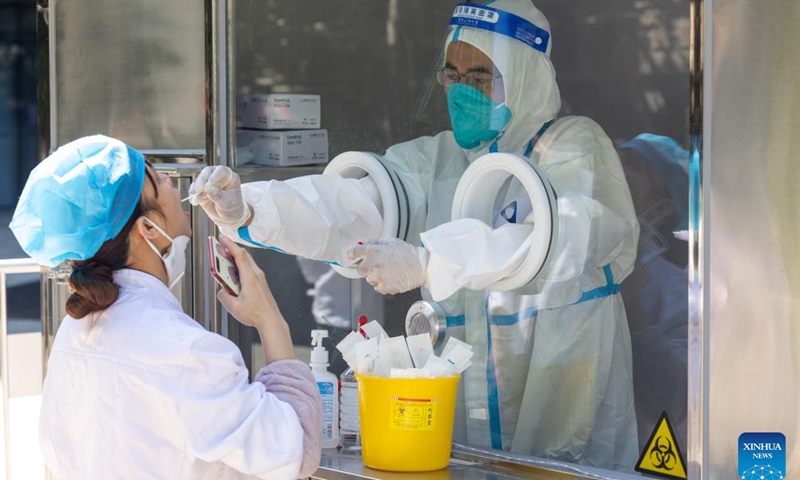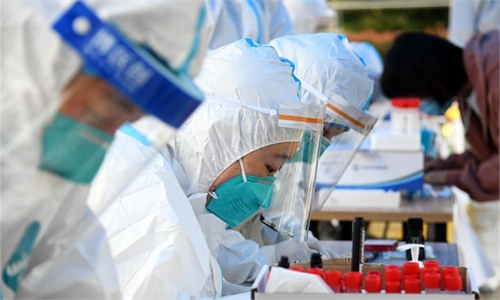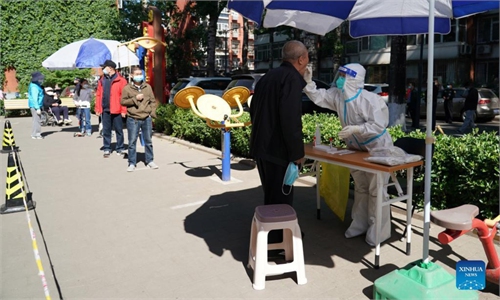Regular testing slows down as cities across China cancel or reduce frequency of nucleic acid testing amid improved epidemic situation

A staff member takes a swab sample from a woman for nucleic acid test in Huangpu District, east China's Shanghai, May 8, 2022. Shanghai has set up fixed and mobile acid testing sites in areas such as residential communities, office spaces, business parks and in the vicinities of subway and other public transport stations in accordance with the epidemic situation. Photo:Xinhua
The rush to regular testing has slowed down, less than two months after the construction of 15-minute distance nucleic acid testing services began in big cities across the country.
In light of the stable overall improvement of the epidemic situation in many areas, multiple cities have adjusted their request for the nucleic acid testing cycles. Some cities extended the regular testing period from three days to five days while other canceled the regular testing request.
Starting from Wednesday, residents entering communities, schools, work units and other public places in Wuhan, Central China's Hubei Province are required to provide negative nucleic acid test results within five days, local media reported.
"Based on the current epidemic prevention and control situation in Hubei, the once-in-a-three-day testing has been adjusted to once-in-a-five-day," said a Wuhan COVID-19 prevention and control official.
Starting on Wednesday, the city of Hefei in East China's Anhui Province has suspended regular free nucleic acid testing every seven days. The city previously announced on June 18 that it would conduct nucleic acid tests once every seven days.
On the same day, Lu'an in Anhui issued a notice to cancel the once-in-a-five-day regular nucleic acid testing, and people who do not take regular testing will not receive the pop-up notifications and yellow health codes as an alert.
Nucleic acid sampling sites in places where people gather should be appropriately reserved to meet the public's demand for testing, said the city.
Nucleic acid tests should be carried out every day in fever clinics, isolation wards and other key departments of medical institutions. Cold-chain, take-out workers, elderly care workers, isolation point workers and other front-line employees are requested to take a nucleic acid testing every three days.
Huainan, another city in Anhui, which is a low-risk area, also issued a similar notice cancelling regular testing on Tuesday.
A number of hospitals in Shanghai announced on Tuesday that patients and their family members could seek medical treatment with a negative nucleic acid test certificate from within 72 hours or an on-site negative antigen test result. Previously, most medical institutions in Shanghai required the patients to show negative nucleic acid certificates within 48 hours.
The regular testing fever suddenly cooled down less than two months since the construction of a 15-minute circle of nucleic acid testing services in big cities began in early May.
Thousands of 15-minute distance testing services had been set up. South China's Guangdong Province alone has more than 440,000 nucleic acid testing personnel who have carried out more than 10 billion tests, according to media reports. China's nucleic acid testing capacity increased to 57 million tubes per day in May this year from 1.26 million tubes per day in March 2020, a 45-fold increase in one year, Health Insight, a Chinese media outlet, reported.
China has almost created the world's largest nucleic acid testing industry from scratch. According to the estimation of Soochow Securities, the annual cost of citywide testing for all the first- and second-tier cities is about 670 billion yuan ($99.83 billion). Even in some cities free of the epidemic, a negative nucleic acid testing is a request for residents to dine out, go to the movies and go to the park.
"Whether to build 15-min distance testing service needs to be evaluated based on local epidemic risk, population size, frequency of nucleic acid testing and other factors. Blindly following the trend is more of an unnecessary waste of resources," Lu Hongzhou, head of Shenzhen's anti-epidemic expert team and head of the Third People's Hospital of Shenzhen, told the Global Times on Thursday.
Lu believes that regular testing is necessary for high-risk areas and groups while in low-risk areas and communities, it is not necessary to carry out continuous and high-intensity regular nucleic acid testing.
Several experts told the Health Insight that in key areas, one or two tests per week are sufficient for detecting the epidemic. Lu noted that even under the strictest conditions, testing once or twice a week is sufficient.
"At present, we still lack highly effective vaccines and antiviral medicines, and the current prevention and control strategy based on strict control and regular nucleic acid testing will continue for some time," reported Lu, adding that "Our strategy will change as we develop highly effective, broad-spectrum vaccines and highly effective molecular antiviral drugs."
At a press conference on June 9, He Qinghua, an official from the National Health Commission, stressed that checking people's nucleic acid testing results should not become normal in places without outbreaks or a risk of imported cases. The method should mainly be used in places that are undergoing outbreaks and among groups facing high infection risks.



